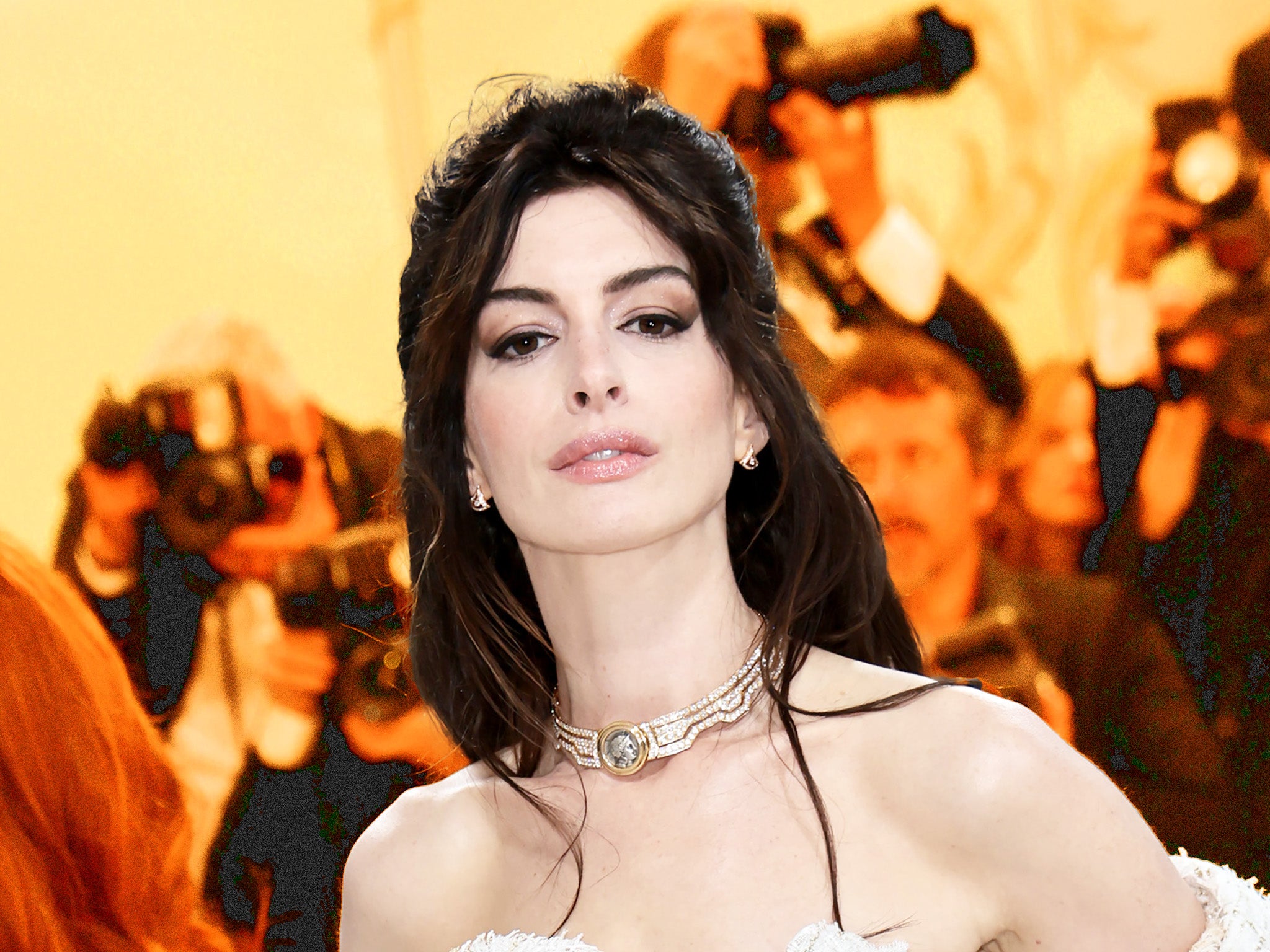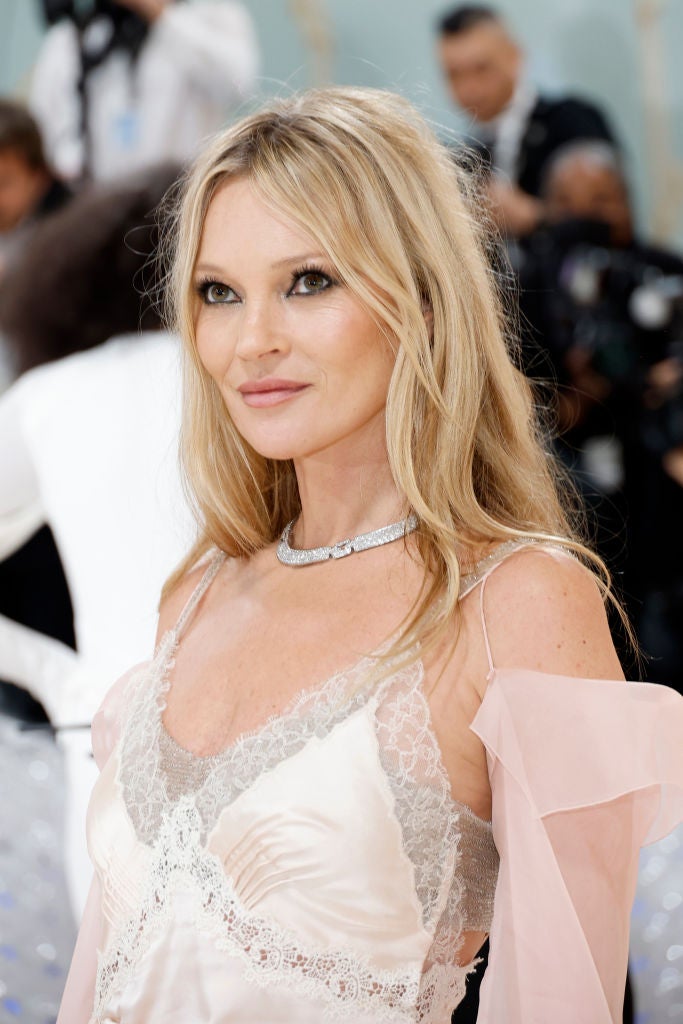‘Unproblematic people don’t age’ reflects the stupidest kind of beauty standard
No, Anne Hathaway doesn’t look eternally ageless because she’s ‘morally pure’, writes Eloise Hendy, and saying so is just more proof that – when it comes to ageing in the public eye – we still don’t know what we’re talking about


If a person has ugly thoughts,” Roald Dahl wrote in The Twits, “it begins to show on the face. And when that person has ugly thoughts every day, every week, every year, the face gets uglier and uglier until you can hardly bear to look at it. A person who has good thoughts cannot ever be ugly.”
This is classic Dahl – a simple, moralising fable encouraging kids to be nice and good, even in their minds, which is just twisted enough to also make them wary of unconventional-looking people. The rest of the passage might attempt to stake a claim for beauty being disconnected from physical attributes and aesthetics – suggesting that “you can have a wonky nose and a crooked mouth and a double chin and stick-out teeth, but if you have good thoughts it will shine out of your face like sunbeams and you will always look lovely” – but the damage is already done. Beauty is equated with ethics, with virtue. Looking good means being good. I thought people eventually grew out of this kiddy fairytale understanding of beauty – the narrative that pits the slim, white, innocent princess against the fat, old, warty hag; one standing for good, the other for evil. But lately it seems a lot of people, particularly when it comes to the issue of ageing, have swallowed this idea hook, line and sinker.
In the sexist society we live in, ageing has always been an issue, especially for women. “She looks great for her age,” people say as a compliment. Many declare “I can’t believe she’s forty-something” in the same way a certain margarine brand announces “I can’t believe it’s not butter”. Yet recently this long-standing ageism seems to have taken on a new, moralising tone. And, in this modern fairytale, Anne Hathaway has been cast as the slim, white princess.
One of the first tweets I saw being bandied around after the Met Gala last week featured three images of Hathaway in her white tweed Versace gown, with the caption: “this is how u age when u are unproblematic.” That particular tweet went viral, but it’s not the first time this exact thought has been expressed – variations have gone viral with regularity since at least 2020.
It’s not just Anne, either. Other female actors have been drawn into this line of thinking. Repeating the idea that “unproblematic people don’t age”, one person shared a photo of Hathaway alongside one of Gemma Chan, marvelling that both women were 39. That’s nearly 40, you could almost hear being screamed between the lines, which we all know means ancient, past it, and over the hill. And yet, these women look great! What gives!? Oh right, it must be because they’re so innately good and lovely and only think nice thoughts.
While most of these tweets should of course be read as somewhat tongue-in-cheek, anything that perpetuates the idea that beauty equals virtue should trouble us. Promoting attractiveness and youthfulness as moral qualities only works to instil anxiety and shame around natural ageing processes. The dark side of this line of thinking was plain to see in another viral tweet from last week. On the left: a photo of Kate Moss in her Nineties heyday, looking over her bare shoulder with a classic, mouth-slightly-agape model pout. On the right: a photo of Kate Moss now, smiling on the Met Gala’s red carpet. “This is why I stopped smoking and doing coke,” the caption read. I’ll admit, I had to read it twice to parse the tweet’s meaning – to fully understand that it was proclaiming that supermodel Kate Moss, smiling aged 49 at one of the world’s most illustrious and exclusive events, should be seen as a cautionary tale. Don’t do what she did, kids, or you might look like that! (“That” being “a few lines around the eyes”.)
Sure, a life of heavy smoking and hard caning is probably not the best idea long-term. But that’s because of the organ damage you might sustain, not because it might give you crows’ feet. And in any case, this is Kate Moss we’re talking about! It is endlessly ironic that the very woman who was declared dangerously beautiful 30 years ago – and an impossibly waifish beauty ideal, for any woman over size zero – has now been rendered some kind of living health warning at precisely the moment she’s started showing the most minimal signs of being human after all. And honestly, if Moss is now a crone, just take me out back and shoot me – I have more wrinkles around my eyes than she does, and I’m only 29.

Indeed, perhaps because I am only months away from turning 30 – an age that is still thought to be some kind of threshold, a crossing-point between youth and the inevitable creep of death – I have recently started noticing how pervasive the “anti-ageing” beauty culture crusade truly is. And that’s because I’ve become a target. My algorithm-inspired adverts for Aperol and feminine hygiene have suddenly been replaced with ones for egg-freezing and filler treatments. I’m being pushed retinol, and stories about “Baby Botox” and the trendy plastic surgery known as “buccal fat removal”. As the constant background thrum to our lives, these things have an insidious effect. I’ll admit that seeing a recent photo of myself where I looked tired, and the lines on my forehead and around my eyes seemed carved in like someone had taken a chisel to me, prompted me to search for botox clinics in my area. In this self-hating haze, I thought it could be a 30th birthday treat.
All of this adds up to a culture of judgement and shame, which encourages women to make themselves invisible after a certain age. “Meg Ryan, 61, looks unrecognisable”, one headline screamed last week, alongside an image of a very recognisable Meg Ryan, who, like Kate Moss, was simply smiling while over 40. Worse still, the article itself poured scorn on Ryan for potentially having undergone cosmetic procedures. On her first public outing in months, the story declared, Ryan “displayed an impossibly smooth complexion” and “boasted a plumper pout and wrinkle-free skin”. With this kind of media reaction, is it any wonder that women over 60 opt to remove themselves from the public eye? Whether you age “naturally” like Kate, or fight ageing “too conspicuously” like Meg, you’re damned either way.
Yet, in this era of “Instagram Face”, what does “ageing naturally” even mean anymore? I doubt Kate Moss hasn’t had the odd “tweakment”. I think it often goes unrecognised, or unspoken, just how rare it is to see anyone in the public eye who hasn’t “had some work done”. It’s a running joke that men don’t know what “no make-up” really looks like, but it increasingly seems like everyone is in danger of forgetting what real faces look like, too – ones that aren’t injected, lifted, plumped, drained of fat, or simply facetuned.
In our hypercapitalist, sexist society, ageing is something you can buy out of. This happens both directly and indirectly. Wealth buys private healthcare, cosmetic dentistry, expensive haircuts and colours, good make-up, gym memberships, personal trainers, private chefs. Multiple holidays a year. Massages, saunas, vampire facials, hair transplants. Yet it also buys the more intangible luxuries of time, safety, and the swaddling of comfort. We know, for example, that stress is ageing. We know that financial insecurity, housing insecurity, and precarious labour take a toll not just on the mind but on the body. Long hours, night shifts, debt, experiencing prejudice – all age people prematurely. Poverty literally kills. All of this means that ageing, and beauty culture more broadly, should never be thought of in a vacuum. There is a politics to ageing. Personally, I lay the blame for the dark circles under my eyes squarely at the foot of the Tory government, who have been in power for my entire adult life (with a special mention to the Lib Dems for their part in saddling me with nearly 100k of student debt).

But then there is the flip side to all this. Because even discussing signs of ageing as evidence of stress, or financial hardship, or just the everyday strains of life, still makes out that ageing is some kind of punishment: evidence of a hard life, or something handed down from the universe in direct relation to how much you’ve suffered. But ageing is also about joy. Wrinkles, stretchmarks, sun spots – all are signs that someone has laughed, smiled, grown, given birth, sat in the sun on warm summer days, smoked cigarettes with friends late at night, or gone to a lot of excellent parties. In other words, that they have lived.
It might stem from the fear of our shared and unavoidable mortality, but attempting to banish ageing is, ultimately, a denial of life. It means prioritising restrictive beauty standards – ones created by patriarchy, white supremacy and capitalism – over movement, instinct, desire, pleasure and chaos. Ageing is a privilege. It is a gift that many people don’t get to enjoy. When we see photos of women smiling so broadly that their eyes crinkle and crease, we shouldn’t regard it as a cautionary tale; we should hope that we might all be so lucky.
Join our commenting forum
Join thought-provoking conversations, follow other Independent readers and see their replies
Comments


Bookmark popover
Removed from bookmarks